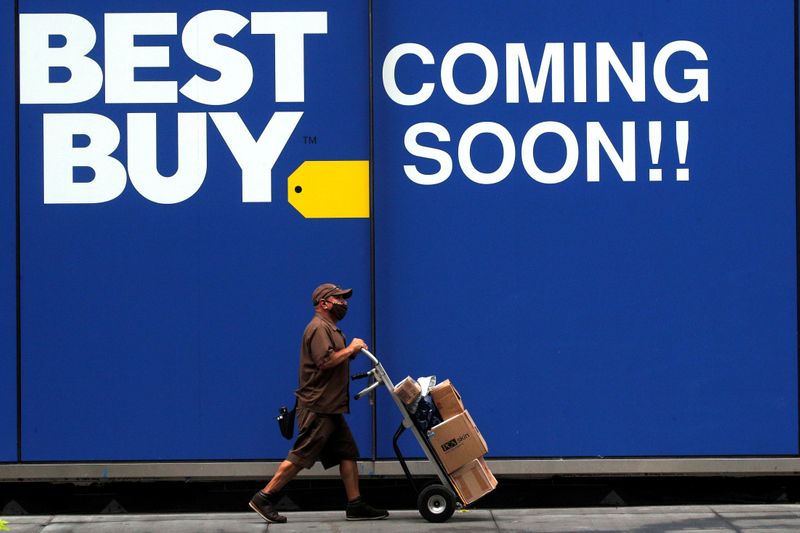Citi maintained a positive stance on Best Buy Co. Inc. (NYSE: NYSE:BBY), raising its price target on the stock to $115 from the previous $100, while keeping a Buy rating. The firm's analyst highlighted an updated model following Best Buy's Q2 earnings, which included increased earnings per share (EPS) estimates for fiscal years 2025 and 2026.
The analyst's optimism is based on early signs of positive earnings revisions for Best Buy, driven by a demand cycle for replacement and innovation in tablets and computers.
There is also an expectation of additional gains as potential interest rate cuts could bolster weaker segments of Best Buy's business, particularly in televisions and appliances.
Despite concerns over the uncertain macroeconomic environment and its impact on consumer spending in the second half of the year, including the crucial holiday season, Citi believes that Best Buy is on a trajectory for growth over the coming years.
The revised price target of $115 reflects a multiple of 16 times the new fiscal year 2026 EPS estimates.
Citi's valuation also considers a forward roll of the current fiscal year multiple based on consensus estimates to the next year. The premium applied in the valuation is justified by an anticipated inflection to same-store sales (SSS) growth, which is expected to outpace the company's five-year average.
Best Buy Co., Inc. reported impressive second-quarter earnings that exceeded expectations, prompting several analyst adjustments. The company's second-quarter earnings per share (EPS) rose by 10% to $1.34, surpassing estimates, and its full-year earnings guidance was raised, reflecting a strong performance in the first half of the year.
Amid these developments, Best Buy's comparable store sales showed signs of recovery, decreasing by 2.3% in the second quarter, a marked improvement from the 6.1% decline in the first quarter.
KeyBanc reaffirmed a Sector Weight rating for Best Buy, expressing optimism for the company's long-term recovery potential. Loop Capital raised its price target for Best Buy to $110, citing significant acceleration in comparable sales and effective expense management.
Piper Sandler increased its price target to $114, acknowledging Best Buy's impressive expansion in EBIT margin and better-than-expected sales. Truist Securities updated their price target to $107, recognizing Best Buy's surpassing of sales and earnings expectations.
Telsey Advisory Group increased its price target for Best Buy to $115, emphasizing the company's effective cost control and growth in higher-margin businesses. Lastly, Jefferies increased its price target to $116, acknowledging the surge in demand for consumer electronics replacements and upgrades.
InvestingPro Insights
As Best Buy Co. Inc. (NYSE: BBY) captures the attention of analysts and investors with its promising outlook, real-time data from InvestingPro provides additional context to the company's financial health and market performance. Best Buy's market capitalization stands at $21.69 billion, reflecting its significant presence in the retail industry. With a Price/Earnings (P/E) ratio of 17.29 and an adjusted P/E ratio for the last twelve months as of Q2 2025 at 15.52, the company shows a balance between its market value and profitability. This is particularly relevant in light of Citi's EPS estimates and price target adjustments.
InvestingPro Tips highlight that Best Buy has maintained dividend payments for 22 consecutive years and has raised its dividend for 6 consecutive years, signaling a commitment to returning value to shareholders. Moreover, the company's strong returns over various periods, including a 13.65% total price return over the last week and a 38.35% return over the past year, suggest a robust performance in the stock market. These metrics, coupled with the fact that Best Buy is trading near its 52-week high, can offer investors additional confidence in the company's growth trajectory.
For those seeking a deeper dive into Best Buy's performance and future prospects, InvestingPro offers a wealth of additional tips—15 in total, including insights on the company's profitability, debt levels, and industry standing. For more detailed analysis and exclusive tips, interested readers can visit https://www.investing.com/pro/BBY.
This article was generated with the support of AI and reviewed by an editor. For more information see our T&C.
